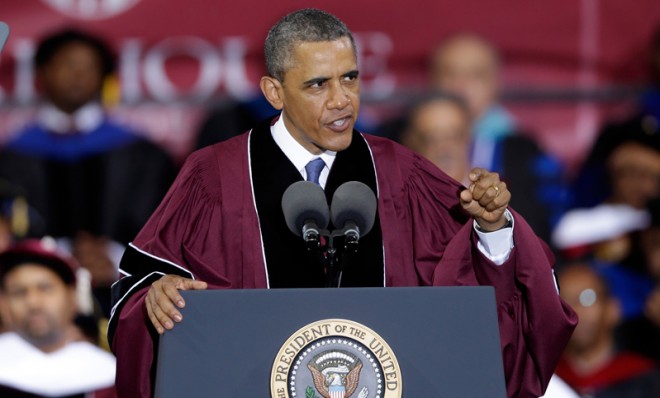
Does obama unfairly hold blacks to a different standard?
- Select a language for the TTS:
- UK English Female
- UK English Male
- US English Female
- US English Male
- Australian Female
- Australian Male
- Language selected: (auto detect) - EN
Play all audios:

On Sunday, President Obama delivered a commencement address at Morehouse College, the historically black all-male school, espousing personal responsibility and exhorting graduates to not use
their race as an excuse for failure. "We've got no time for excuses — not because the bitter legacies of slavery and segregation have vanished entirely; they haven't,"
Obama said. "Not because racism and discrimination no longer exist; that's still out there. It's just that in today's hyperconnected, hypercompetitive world, with a
billion young people from China and India and Brazil entering the global workforce alongside you, nobody is going to give you anything you haven't earned. And whatever hardships you may
experience because of your race, they pale in comparison to the hardships previous generations endured — and overcame." For the most part, Obama's speech was well-received, both
by his audience and the national press. "He spoke movingly of his struggles to discuss the responsibility of men as fathers and husbands, and the need for the young graduates to be role
models," wrote Zeke J. Miller at _TIME_. SUBSCRIBE TO THE WEEK Escape your echo chamber. Get the facts behind the news, plus analysis from multiple perspectives. SUBSCRIBE & SAVE
SIGN UP FOR THE WEEK'S FREE NEWSLETTERS From our morning news briefing to a weekly Good News Newsletter, get the best of The Week delivered directly to your inbox. From our morning news
briefing to a weekly Good News Newsletter, get the best of The Week delivered directly to your inbox. Yet while the president sought to strike an inspirational tone with his message, some
viewed his race-based remarks as part of a disturbing pattern in which he has held blacks to a different standard than other demographics. _The Atlantic's_ Ta-Nehisi Coates argues that
while the president urged African Americans to accept personal responsibility, he has not made that the focus of his remarks to other groups. Further, Coates says that Obama's focus on
his personal background omitted the important role social policy plays in preparing people for success. He argues that the president, as the most powerful policy-maker n the nation, is in a
prime position to affect those policies. "As the president of 'all America,' Barack Obama inherited that policy," he says. "I would not suggest that it is in his
power to singlehandedly repair history. But I would say that, in his role as American president, it is wrong for him to handwave at history, to speak as though the government he represents
is somehow only partly to blame." A free daily email with the biggest news stories of the day – and the best features from TheWeek.com A similar criticism of the president caused an
uproar at Morehouse, and led the college to reduce the role of pastor Kevin Johnson in its graduation ceremonies. Johnson had criticized what he said was a lack of diversity in the
president's cabinet, in an op-ed titled, "A President for Everyone, Except Black People." Obama "is more of a historical leader than he is a transformational leader for
the African-American community," Johnson wrote. Rich Benjamin, writing in _Salon_, said the speech had an "ironic whiff" because the president shied away from discussing, in
stark terms, the economic disparity between races in America. Rather than focusing on how the recession is "throwing non–college educated black men under the bus," the president,
employing "creaking racial symbolism," instead told graduates to not throw themselves under the bus. Similarly, Jarrett L. Carter asked why the president talked about what
graduates could do for themselves, but not about what he could do for them. Writing in the _Huffington Post_, Carter, the founding editor of a website that covers historically black
universities, said the president could have done more to promote existing institutions that develop young men into future leaders. "His belief in the individual potential of black
people is instantly recognizable, but his disconnection from creating attention and support for systems which specifically cultivate and inspire black people to realize that potential has
been startling," he says.
